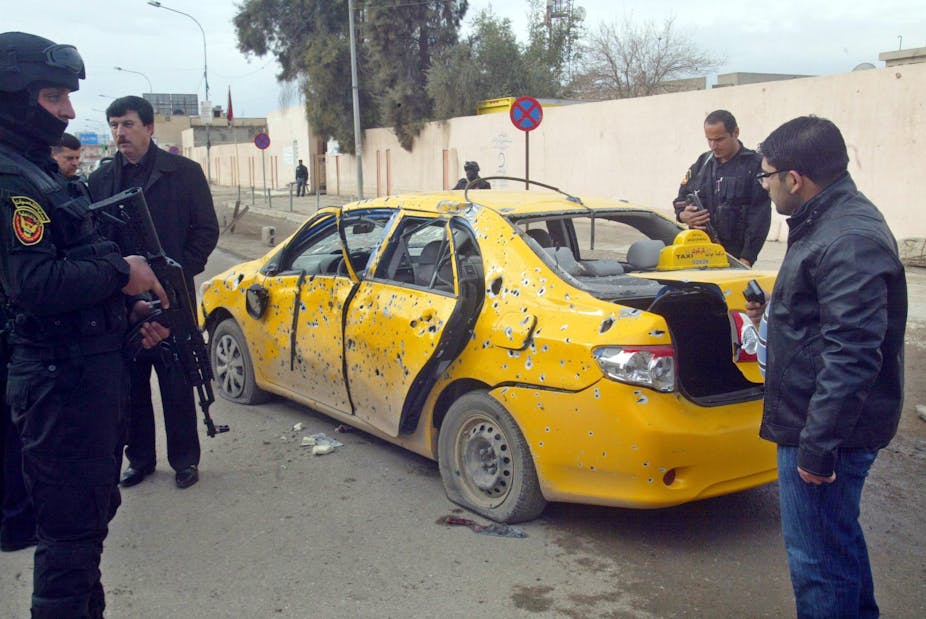Last week in Baghdad, 17 men were executed.
Nothing special to note here in the conflict ridden, post-US withdrawal landscape of Iraq, except that this time they were executed by an Iraqi court.
This was done as a form of retributive justice against convicted members of the Al Qaeda affiliated terrorist cell, Islamic State of Iraq, after their horrific massacre inside the Our Lady of Salvation Syriac Catholic Church in October 2010, which resulted in 52 deaths and 67 injuries.
UN Human Rights Commissioner, Navi Pillay, condemned this judicial ruling for its lack of fairness and transparency but the death penalty has been in process in the fragile Iraqi judicial system since 2004, and more notoriously before during Saddam’s iron-fisted rule. It was briefly suspended during 2003 only.
Christian Iraqis, once a vibrant minority community in Iraq now represent more than 40% of forced migrants and refugees. This has also become a trend with Arab uprisings last year, particularly in Egypt, with many Coptic Christians opting to escape a sectarian dominated political environment personified in the new parliament by the Muslim Brotherhood and Salafi MPs.
What belies these sectarian clashes in Egypt & Iraq is a state of profound political instability. It has acutely intensified in the past two months with the last US troops pulling out of Iraq and scheduled departures from Afghanistan as well.
The view from Australia
This does not herald the end of the Bush inspired mantra “war on terror” but as Mohsen Beni Saeed, an Iraqi-Australian writer and translator, describes it is “the next step of creative chaos”.

When I messaged him a few days after the US withdrawal from Iraq to ascertain his thoughts, he answered promptly, “it creates a crisis for every faction, whether governing or not, in Iraq and all the neighbours … the withdrawal is a strategic step for many”. The latest round of bloodshed in Syria and the rising fears of an impending strike on Iran from Israel or US confirm Mohsen’s fears.
Kassim Abood, a prominent community leader and refugee advocate in the Iraqi diaspora in Sydney, said “I’m happy but very concerned”. This was because the Al Maliki government hadn’t built up an adequate police force to withstand the violence of sectarian-fuelled terrorist groups. Abood also cautioned that Ba'athist paramilitary cadres are regrouping and pose a real threat to the security of everyday Iraqi citizens.
Abood’s predictions have proven true thus far with a collapsing government where the level of political bickering and personal threats has risen exponentially, and where the same Iraqi justice system that executed 17 men also issued a warrant against Vice President Tariq Al Hashimi for orchestrating a series of attacks on government officials. In that time he has sought refuge in the relatively safe haven of northern Iraq – a Kurdish stronghold.
“Peace” does not equal stability
A week after the scheduled withdrawal a series of horrific car bombings in Baghdad took place, claiming 72 lives and injuring another 217. In his bitingly witty online existential musings, Wasif Shanoon weekly columnist for Al Furat, an Iraqi newspaper with a large Arabic speaking readership around Australia, writes “in Damascus the foreign ministry strongly condemned the latest terrorist acts that hit the Iraqi capital … thanks but since when?”

A couple of hours earlier he had posted a gruesome photo with a woman mired in blood from the earlier bombings with his own caption: “On the soil of Iraq – blood!”.
In what has been commonly dubbed the “Arab Spring” – with the flourishing of democratic movements in the Arab world – it is necessary not to forget the accumulated losses of an almost nine-year occupation in Iraq. We also cannot ignore the Arab governments, including the Iraqi one, still not willing to give up their iron fisted rule.
Iraqis will never forget
It is important to understand that the pain, indignity and humiliation of war still resides deep within Iraqi hearts, minds and bodies.
As Aghnar Niazi, an award winning visual artist residing in Sydney, has said, “if you look at my paintings you will see the internal expressions what we as Iraqi have been going through – sadness, joy, exhaustion… we are on open book for the world to see”.
Her words and her paintings are a testament to a new chapter in Iraq’s future which hopefully will be less bloody.

